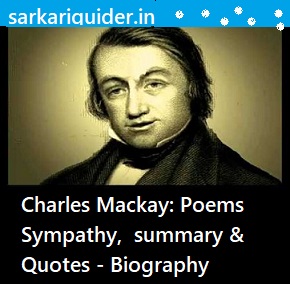Charles Mackay: Poems Sympathy, summary & Quotes – Biography

Charles Mackay
About the Poet
Charles Mackay was born in 1814 in Scotland. His father was a lieutenant in the Navy. He was looked after by foster parents since he lost his own mother while he was very young.
He started writing articles for the local newspaper of Belgium, where he served as a Private Secretary to William Cockrill in 1830 when he was only sixteen. He returned to Britain in 1832. There he started contributing to several newspapers.
Mackey rose to be a famous journalist and poet. He wrote a number of songs and short poems. He died at the ripe age of 75 years in 1889.
About the Poem
One day, the poet was in grief. He was in need of help. A proud man helped him with money. He didn’t say a single word of sympathy. After some time when the poet recovered, he paid him back the money. He also spoke thanks for the help.
Once again the poet was in grief and pain. A poor man served him day and night. He also pressed his head and gave him bread to eat. The poet recovered soon. He couldn’t repay for the kind-hearted man’s services. He realized that heavenly sympathy is greater than money.
SYMPATHY
I lay in sorrow, deep distressed;
My grief a proud man heard;
His looks were cold, he gave me gold,
But not a kindly word.
My sorrow passed I paid him back
The gold he gave to me;
Then stood erect and spoke my thanks
And blessed his charity.
I lay in want, grief, and pain;
A poor man passed my way;
He bound my head, he gave me bread,
He watched me night and day.
How shall I pay him back again
For all he did to me ?
Oh, gold is great, but greater far
Is heavenly sympathy.
-Charles Mackay
Appreciation
Have sympathy for all. It is a divine quality. Have sympathy for the old, his days are numbered. Have sympathy for the young, they depend upon you for their growth. Have sympathy for the youth; they seek your support for their advancement. Be sympathetic to all and live a cheerful and peaceful life.
Theme : Between real sympathy and cold charity, the former evokes deeper love and gratitude.
Further Study of the Poem
Once the poet was in great trouble. A rich and proud man helped him with money. He was, however, indifferent to the poet. When the trouble was over, the poet paid his money back with thanks. Once again the poet was in trouble. A poor man looked after him day and night and gave him food. The poet feels that he would be unable to pay him back Sympathy is greater than gold.
Important links
Ralph Waldo Emerson – Poems, Quotes & Books- Biography
What is poetry? What are its main characteristics?
What is a lyric and what are its main forms?






